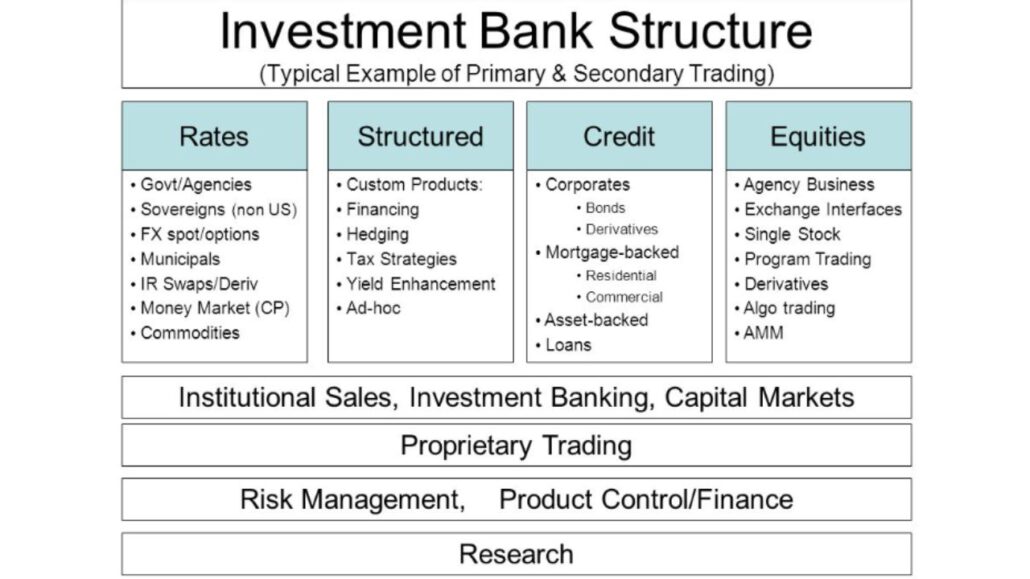Securing a job at an investment firm can be a rewarding career move. These firms are crucial in managing financial assets, making investment decisions, and generating client returns.
Whether you’re a recent graduate, a seasoned professional looking for a career change, or someone interested in finance, this guide will provide valuable insights on getting a job at an investment firm.
Understand the Industry
Comprehensive knowledge is key to securing a job in the investment firm industry. Begin by familiarizing yourself with the various types of investment firms, including asset management, hedge funds, and private equity. Understand their functions, such as managing portfolios, risk assessment, and financial analysis. Stay updated on market trends, regulations, and investment strategies.
Acquiring relevant certifications like CFA or FRM can enhance your credibility. Networking with professionals in the field and seeking internships or entry-level positions can provide valuable experience. By mastering these aspects, you’ll be well-equipped to pursue a successful career in the investment firm industry.
Self-Assessment
Before diving into the job search process, take some time for self-assessment. Understand your strengths, weaknesses, interests, and career goals. Consider the following questions:
What are your core skills and competencies?
Are you more inclined towards research, analysis, or client interaction?
What type of investment firm are you interested in (e.g., hedge fund, private equity, asset management)?
What are your long-term career aspirations in the finance industry?
Understanding your preferences will help you tailor your job search strategy.
Educational Qualifications
Investment firms typically seek candidates with strong educational backgrounds. While requirements may vary, here are some common qualifications that can enhance your prospects:
Bachelor’s degree in business, finance, economics, or a related subject
- Advanced degrees such as an MBA or CFA (Chartered Financial Analyst) can provide a competitive edge
- Relevant certifications like Series 7 and Series 63 for roles involving securities trading and sales
- Gain Relevant Experience
Experience is invaluable when seeking employment at an investment firm. To gain exposure, entry-level candidates should consider internships, co-op programs, or entry-level positions at smaller firms. Here’s how to gain relevant experience:
- Apply for internships or summer analyst programs offered by investment firms or banks.
- Join finance-related student organizations or clubs to network and gain relevant skills.
- Pursue part-time positions or volunteer opportunities in finance-related roles.
- Networking
Networking is a crucial aspect of landing a job at an investment firm. It’s often said that many jobs in finance are found through connections. Here’s how to build and leverage your network:
- Attend industry conferences, seminars, and workshops to meet professionals in the field.
- Join finance-related social media groups and platforms like LinkedIn.
- Reach out to alums or professionals working in investment firms for informational interviews.
- Craft an Outstanding Resume and Cover Letter
Your resume and cover letter are your first impressions, so make them count. Highlight relevant skills, experiences, and achievements.
Emphasize your quantitative skills, attention to detail, and ability to work under pressure. Tailor your application materials for each specific job application.
Develop Relevant Skills and Knowledge
Developing relevant skills and knowledge is crucial to secure a job in an investment firm. Start by understanding financial markets, investment strategies, and economic trends. Gain proficiency in financial analysis, risk management, and asset valuation. Acquire expertise in quantitative methods and data analysis to make informed investment decisions. Also, hone your communication and interpersonal skills to effectively interact with clients and colleagues.
Seek pertinent certifications like Chartered Financial Analyst (CFA) or Financial Risk Manager (FRM) to bolster your credibility. Keep abreast of industry advancements through ongoing education and networking. Developing these skills will establish you as a valuable asset within the competitive realm of investment firms.
Network and Build Connections
Building connections is paramount for securing a job in an investment firm. Networking opens doors to opportunities often inaccessible through traditional means. Attend industry events, join professional groups, and engage on social media platforms like LinkedIn. Establishing genuine relationships with professionals in the field can lead to valuable insights and referrals.
Tailor Your Resume and Cover Letter
Highlights relevant skills, experiences, and achievements, emphasizing quantitative abilities, financial analysis, and market research. Tailor your resume to showcase proficiency in investment analysis tools and software. In the cover letter, articulate your passion for finance and investment, aligning your goals with the firm’s objectives. Address specific job requirements and demonstrate your background makes you a perfect fit. Ensure both documents are concise, error-free, and visually appealing.
Prepare for Interviews

Investment firms often conduct rigorous interviews to assess candidates. Be prepared for technical questions and case studies.
Here are some tips:
- Review financial concepts and industry trends.
- Practice behavioural interview questions.
- Be ready to discuss your investment thesis and how you analyze financial data.
- Demonstrate Your Passion
Passion for finance and investment is a valuable asset. During interviews, share your enthusiasm for the industry, and be prepared to discuss your investment ideas or views on market trends.
Showcase Your Analytical Skills
Highlighting your proficiency in data analysis, financial modelling, and market research to stand out. Showcase your aptitude for dissecting complex financial data, identifying trends, and making informed investment decisions. Emphasize your track record of generating actionable insights and delivering tangible results. Utilize real-world examples and quantify your achievements to illustrate your value proposition.
Demonstrating your analytical prowess will establish your suitability for the position and enhance your prospects of securing your desired job in an investment firm.
Stay Informed
The financial industry is dynamic and constantly evolving. Stay informed about the latest market developments, economic news, and regulatory changes.
Subscribing to financial news outlets and reading industry publications will keep you well-informed.
Be Persistent
Getting a job at an investment firm can be competitive and challenging. Rejections are a part of the journey, but persistence is key.
Keep refining your skills, expanding your network, and seeking opportunities.
Consider Alternative Routes
Consider alternative paths if you find securing a position directly at an investment firm challenging. You can gain valuable experience in related roles like investment banking, corporate finance, or financial consulting and then transition into an investment firm later in your career.
Investment Banker Salary
Investment bankers earn competitive salaries, with entry-level analysts typically starting between $70,000 to $150,000 yearly, often with substantial year-end bonuses. Higher-level professionals can earn multi-million-dollar compensation packages.
Investment Banker Job
Investment bankers work in finance, helping clients with capital raising, financial advisory, and complex transactions like mergers and acquisitions (M&A). They analyze data, conduct market research, and manage client relationships.
How to Become an Investment Banker
To become an investment banker, you typically need a bachelor’s degree in finance, economics, or a related field, relevant experience through internships or entry-level positions, networking, and, optionally, a master’s degree like an MBA.
Investment Banker Degree
Most investment bankers have bachelor’s degrees in finance, economics, business, or related fields, and some pursue advanced degrees like an MBA.
Where Do Investment Bankers Work? Investment bankers work in financial institutions such as investment banks, commercial banks, private equity firms, and hedge funds, often in major financial centres like New York City and London.
Daily Tasks of Investment Bankers
Investment bankers engage in financial analysis, client meetings, presentations, and managing transactions such as mergers and acquisitions. They also conduct market research.
Investment Banking Demographics

The industry has been working to increase diversity, traditionally male-dominated. More women and individuals from diverse backgrounds are entering the field.
Getting Started in Investment Banking
Start with education, networking, and gaining relevant experience through internships or entry-level positions. Networking is crucial for accessing job opportunities and insights into the industry. Securing an investment banking job requires a blend of academic prowess, networking finesse, and perseverance.
Candidates should focus on building relevant skills, networking with industry professionals, and crafting a standout resume and cover letter. Staying informed about market trends and honing interview techniques is essential for success.
How to Get an Investment Banking Job
To land an investment banking job, start by honing analytical and financial skills through relevant coursework or certifications. Network extensively, attending industry events and connecting with professionals. Craft a polished resume highlighting relevant experience and skills. Prepare for rigorous interviews by practising technical questions and demonstrating your passion for finance.
Consider internships to gain practical experience and enhance your resume. Utilize online resources and job boards to find openings and apply strategically. Be persistent and adaptable throughout the process, seeking feedback and continuously improving. With determination and preparation, you can secure a rewarding career in investment banking.
Conclusion:
Securing a job at an investment firm is a rewarding endeavour that requires preparation, dedication, and continuous learning.
By following the steps outlined in this guide, you can increase your chances of landing a position at an investment firm and embark on a fulfilling career in finance.
Remember, the journey may be challenging, but with persistence and the right strategy, you can achieve your goals in the world of investments.
FAQ
How to work for an investment firm?
To work for an investment firm, start by gaining relevant education in finance or economics. Develop analytical skills and stay updated on market trends. Networking is crucial; attend industry events and connect with professionals. Gain experience through internships and seek certifications like CFA.
Is it hard to be hired as an investment banker?
Yes, securing a job in investment banking can be challenging due to its competitive nature and high entry requirements.
What do you need to get a job in investment banking?
You need a strong educational background in finance or a related field, relevant internships or experience, excellent analytical skills, and effective networking.
Do investment bankers make a lot of money?
Yes, investment bankers can earn substantial salaries and bonuses, but the exact amount varies based on experience, firm, and location.
Why do I want to work for an investment firm?
Potential reasons include a passion for finance, interest in investment analysis, desire for a challenging career, and the opportunity to work with top financial professionals.
How to Become an Investment Banker?
Becoming an investment banker involves earning a relevant degree, gaining experience, networking, and successfully navigating the rigorous interview process.
How do I make an investment banking resume?
Create a well-structured resume highlighting your relevant skills, experience, and achievements. Tailor it for each job application, emphasizing quantitative abilities.
What questions will I be asked in the interviews?
You can expect behavioural questions about your experiences, technical questions related to finance and investment concepts, and questions assessing your problem-solving abilities and teamwork skills.



